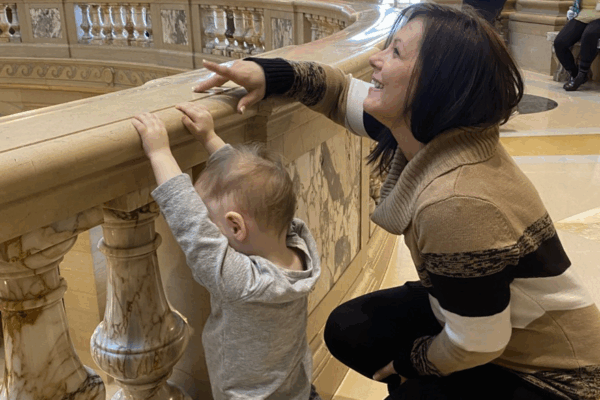When the Senate voted to restore the vote to upwards of 50,000 Minnesotans, Jennifer Schroeder saw it on TV and immediately texted her boyfriend the good news.
State law barred anyone on felony probation or supervision from voting, even if they were living in the community, working, paying taxes, and raising families. In the case of Schroeder, who was sentenced to 40 years of probation on a drug charge, that meant not voting until age 71.
That disenfranchisement continued even though she had turned her life around. Schroeder got sober, enrolled in college, and graduated with a 3.8 GPA. She became an addiction counselor, a mom, and an activist who testified before the state Legislature.
“I felt very stripped of my rights,” she said. “I felt like it was very unfair. If I’m going to be doing all the things I’m doing, you can’t tell me I can’t have a say.”
On February 21, that finally changed. To tears of joy and applause, with ACLU-MN supporters in the Capitol halls and gallery, the Minnesota Senate voted to restore one of the most basic civil liberties, the ability to choose one’s government. On March 3, the Governor signed it into law.
Our democracy and our communities became stronger by correcting this historic wrong.
“It’s a big step in the right direction. I am super excited to vote,” Schroeder said.
This fight to end this disenfranchisement took two decades. The ACLU of Minnesota and dozens of other organizations in the Restore the Vote Minnesota coalition advocated at the Capitol for years. People silenced by the law like Schroeder testified, rallied, and wrote letters.
In 2019, the ACLU-MN, national ACLU and Faegre Drinker sued on behalf of Schroeder and others. But on February 15, the Minnesota Supreme Court ruled that our state Constitution does not automatically provide Minnesotans on felony probation with the right to vote upon release from incarceration. The court did note the “deeply disturbing reality” that Minnesota’s denial of the vote had “disproportionate racial impacts.”
That ruling raised the stakes, leaving the decision entirely up to the Minnesota Legislature.
Thanks to the bill’s passage, nearly 50,000 people finally get to choose who represents them. Small business people have a say on policies that protect their employees. Veterans who risked their lives to protect our nation have a voice and a vote. And Schroeder and other parents finally have a say over the school boards that affect their children’s future.
Schroeder already plans to bring her 2-year-old son with her to the voting booth.
“I think I’m going to enjoy most seeing the red ‘I voted’ sticker on my son,” she said. “He gets to start to take part in the voting process from the very beginning.”
Her son’s name? Chance, for second chances.

